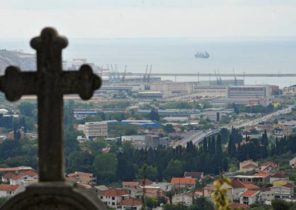
Hundreds of German cities during the second world war came under aerial attacks of the Royal air force (RAF)) and the military air force (USAAF) and turned into ruins. In Hamburg one summer night in 1943 killed more than 30 thousand people. The entire center of the city of würzburg in March 1945, was destroyed with the exception of seven surviving houses. In the city of Pforzheim in February 1945 died exactly 31.4 percent of officially registered residents.
Everywhere in Germany remember the victims of the bombing. There is memorial cemetery of the victims of the air raids, conducted anniversary ceremonies, which often are dignified and serious. They are also being held in Dresden every year on February 13, the anniversary of the fiery assault of the British bombs in 1945.
But the destruction of this city has become a symbol for right-wing extremists. Every year on the eve of February 13 presented new and ever more inflated falsified data on the number of victims (as if from 22 to 25 thousand really killed it is the lack of tragedy), about the alleged attacks with strafing on 14 February 1945 and, of course, the motives of the allies for the bombing of Dresden.
Now it spoke Hecke Bjorn (Björn Höcke), head of the national-reactionary wing of ADG, during a speech to supporters in Dresden. Under the jubilation of the audience, he said that the allies wanted to deprive the Germans “neither more nor less than our collective German identity.” “They wanted to destroy our roots,” said the former history teacher.
The reality looks less pathetic. German cities erased from the face of the earth carpet bombing by the RAF primarily for one reason: because the command of the Royal air force under air Marshal Arthur Harris (Arthur Harris) could destroy them. Dresden became the military technical and historical and political points of view rather random peak bomb war. Harris, in fact, wanted in the fall of 1943 military bombing around Berlin to force the Third Reich to inevitable surrender.
However, it failed, otherwise than a few months earlier in Hamburg, air attacks because of the November bombing of the capital of the Reich was very limited. The reason was the wet and cold weather. But the structure of the city of Berlin, which prevented the rapid spread of all-devouring fire. Only some sections, as the Hansa quarter was really destroyed.
After the failure of the main strategy Harris RAF concentrated on the systematic destruction of German industrial centers. However, in contrast to the USAAF with their daily raids aimed at the factories, the goal of RAF was to get workers in the military industry. Therefore, during night raids bombed residential neighborhoods or the historic city centres, which consisted of houses standing close to each other and often flammable, such as fachwerkhaus, which was used as a “fuse”.
Thus the entire 1944, city after city was subjected to a major bombing. Only in January and February of each other — Stettin, Braunschweig, Magdeburg, Leipzig, Stuttgart, Schweinfurt, Augsburg, and as many as six times in Berlin.
British journalist and historian Frederick Taylor (Frederick Taylor) wrote in “Welt” about the motives of those who planned allied air raids: “it is Possible some commanders of the RAF and USAAF had hoped that they would by air attacks will be able to separate the German people from the Nazi elite, that is to lead to something like a new November 1918. The dream of a decisive blow with the “moral bombing” have been supporters”.
They thought that the uninterrupted bombing of centers of clusters and medium-sized cities could lead the German military industry to collapse. In addition, the headquarters of the RAF and USAAF believed that this was a way to make the lives of Germans literally unbearable — and thereby dramatically reduce the duration of the war.
Misleading. And the British were obliged to know. Massive German air raids on London in the fall and winter of 1940 (for which the RAF attacks on Berlin took revenge) also led to the collapse of British military society.
Says a lot about the constant threat from the air, the people and the party more closely together, stronger than ever before to Stand together — the alternative to this, it seems, was not. But the dynamics of the huge device Bomber Command was hard to slow down when he only came to the movement. Was evading, and cautionary voices, as shown by the historian of Augsburg, Dietmar Awesome (Dietmar Süß) in his thesis “Death from the air”. But they could not get.
At the command level in the RAF in the years 1944-45 in every German city was seen as a military target. Here were located a station, barracks, factories, and government buildings. All this was strategically legitimate targets. In addition, the target list of RAF Dresden was listed — and rightly so — as a center of important military infrastructure to transport forces on all the approaching Eastern front.
And yet the order for the RAF-Bomber-Command, according to which “the enemy’s industrial center was to burn and destroy,” is nothing but “classic hypocrisy,” said Frederick Taylor. Because although the “enemy industry” in Dresden there were many, but this industry has been proven, February 13, 1945 was not the target of the bombing.
On the contrary, archival RAF acts clearly show that was supposed to be destroyed it is the centre of historic Dresden, where, in contrast to the outlying areas in General, there was no industry. Also the main station and other railway facilities were located outside the area the main goal of the night bombing of the RAF.
But it was the same as in würzburg or Pforzheim during the last major allied RAID in mid-April 1945 in Potsdam. What sets Dresden, so that, first, the surprise of dresdensis, who believed their city is not on the right sacred. Second, the power of the fire storm, and in the third — the widespread view that a Saxon residence is “only” a city of culture.
This delusion contributed to the fact that Dresden has formed an idea that he was special. Other cities, too, are greatly affected by such a fate, accepted this fate with all human grief and anger. And I survived it. In large industrial centres and it was clear why the allies bombed them.
Drezdentsam it was not given so easily, and many don’t succeed until now. Therefore, there is still so much bitterness. And so someone like Bjorn Hecke meets here such a storm of applause.







